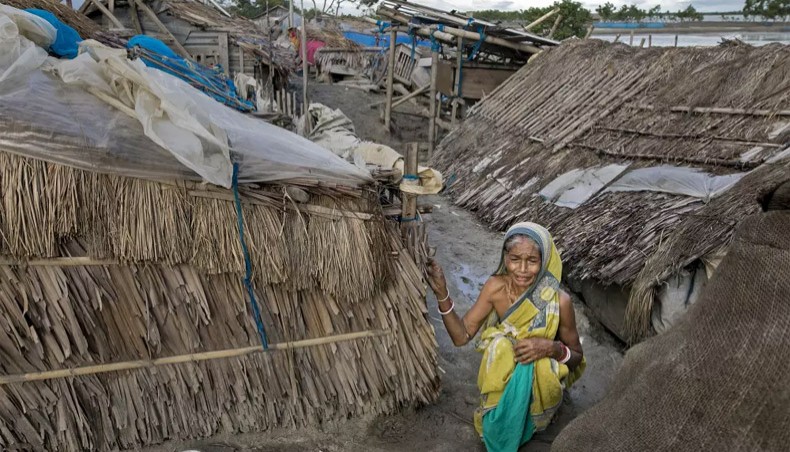
THE 28th Conference of the Parties, COP28, under the United Nations Framework Convention on Climate Change convened in Dubai from November 30 to December 12. With participants from 197 countries and the European Union, COP28 was a diverse assembly of leaders, policymakers, and activists committed to finding collective solutions to the escalating climate crisis. The conference’s agenda was multifaceted, emphasising limiting global temperature increases to 1.5 degrees Celsius, assisting vulnerable communities in adapting to climate change, and achieving net-zero emissions by 2050. The COP28 discussions underscored the urgency of climate action. It also sheds light on the intersectionality of climate change, gender disparities, and the urgent need for comprehensive global responses.
Bangladesh, standing at the forefront of vulnerability to climate change, emerged as a vocal advocate among the COP28 attendees for immediate and concrete climate action. The country’s geographical susceptibility, with two-thirds of its landmass lying less than 20 feet above sea level and rapid urbanisation, underscored the urgent need for targeted interventions. Bangladesh, along with other vulnerable nations, led discussions on climate change mitigation, adaptation finance, loss and damage funds, climate finance, and restructuring the World Bank.
Significant agreements marked the highlights of the COP28 conference. The final accord called for the world’s renewable energy capacity to triple by 2030, underscoring a commitment to sustainable energy solutions and creating a ‘loss and damage’ fund to support the most vulnerable countries facing climate-related disasters, addressing the disproportionate impacts on marginalised communities. The announcement of a groundbreaking $30 billion fund for climate solutions by the United Arab Emirates president aimed to draw $250 billion in investments by 2030 for adaptation and mitigation. Additionally, the launch of the IAEA Lise Meitner Programme, focusing on women’s professional development in the nuclear field, highlighted the imperative of gender inclusion in scientific and technological advancements.
A notable aspect of COP28 was the significant role of women leaders and activists in advocating for gender equality and addressing the disproportionate impacts of climate change on women and girls. A report by UN Women predicted that climate change could push up to 158 million more women and girls into poverty and subject 236 million more to food insecurity by 2050. Leaders highlighted women’s crucial role in climate action, urging increased resources, including financial support, to empower women globally. However, the summit also brought attention to a distressing reality: the intersection of climate change and violence against women. The urgent need for gender-responsive climate action was underscored, with stories from Bangladesh, Botswana, Antigua and Barbuda, and Brazil revealing increased risks of violence against women due to climate-induced crises. Global voices echoed the struggles women face due to climate change, with poignant stories that tell of the climate crisis, loss, and an increased risk of violence against women.
In Bangladesh, rural women face the loss, damage, and physical burdens of climate change, such as water scarcity and heightened health issues. Several studies reveal that in the southern region of Bangladesh, women’s reproductive health risks are exacerbated by salinity. Also, there is growing evidence that salinity contributes to ovarian cancer and tumors. However, patriarchal cultures in Bangladesh continue to ignore these sayings as ‘womanly problems.’ Despite surviving climate-related disasters, many women suffer more during their periods as society neglects reproductive health. The consequences of societal neglect of reproductive health, exacerbated by the reuse of old cloth and water shortages, contribute to generational suffering among women. The resulting health issues contribute to poor well-being and chaos in family relationships, escalating instances of domestic violence. Climate-induced natural disasters, such as droughts, floods, cyclones, waterlogging, and saline water intrusion, push men away from agricultural livelihoods, forcing migration to urban areas for alternative opportunities. This migration dynamic amplifies the vulnerability of women who are left to manage households, contributing to an increase in social violence.
Moreover, COP28 highlighted the plight of climate migrant women in urban areas, emphasising the need for comprehensive responses. Climate migrants in urban areas inhabit temporary shelters characterised by insufficient health and living conditions. Climate migrant women encounter challenges related to inadequate privacy and safety issues in their urban shelters. Moreover, climate migrant women and their family members face difficulties in securing livelihood options due to a lack of work opportunities. These women bear the brunt of household responsibilities without the necessary support, aggravating physical and mental health issues. The findings of research on climate migrant women show that these women spend an enormous amount of time fetching water from miles away, which causes different health issues for these women. The struggle to find shelter, livelihood options, lack of safety, lack of living conditions, and the burden of work, including the loss of social identity in urban environments, increase their vulnerability to violence.
As the world grapples with the escalating climate crisis, COP28 served as a poignant reminder that achieving gender and climate justice requires a holistic approach. The intertwined challenges of climate change, gender disparities, and violence against women demand immediate and coordinated global efforts. The conference, while showcasing progress and commitments, underscored the urgency of inclusive and targeted actions to safeguard vulnerable communities, particularly women, from the adverse impacts of climate change to build a sustainable and equitable future for all. UN Women executive director Sima Bahous emphasised the centrality of women’s rights to climate action, stressing the imperative of giving women a voice in decision-making processes. The recent release of the National Adaptation Plan of Bangladesh (2023–2050) by the government of Bangladesh further underscores the proactive steps taken by nations to address climate change. In support of Bangladesh’s climate efforts, international financial institutions, bilateral donors, and the private sector have collaborated with the Government of Bangladesh to establish the Bangladesh Climate and Development Platform. In conclusion, in Bangladesh, it is imperative to take immediate and essential measures to address the interconnected issues of climate change, gender disparities, and violence against women.
Dr Anita Jahid, an academic and researcher, is a lecturer and unit coordinator Crown Institute of Higher Education, North Sydney.
